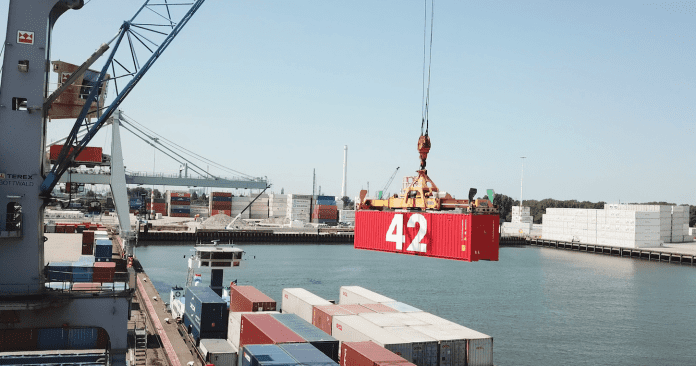French IoT firm Traxens has joined the Port of Rotterdam’s new smart container project, Container 42. It will provide the sensors in the container, to measure various physical and environmental impacts, as the container makes its way around the world in a bid to gain a better understanding of automated real-time logistics.
The so-called Container 42, housing an array of sensors and communications equipment, is on a two-year tour of the world’s ports and logistics hubs, collecting data as it goes about changes in vibration, slope, position, sound, air pollution, humidity and temperature. The unit has also been fitted with solar panels to determine how much power a container can generate during a given journey by ship, train or truck.
The project was launched at Transport Logistic 2019 in Munich, in Germany, in June. Alongside the Port of Rotterdam Authority, partners on the project include major technology companies in the shipping sector, such as IBM, Cisco, Esri, Axians, and Intel.
HyET Solar, Van Donge & de Roo, Awake.ai, Betta Batteries, Simwave, Advanced Mobility Services, Kalmarm and Shipping Technology are also involved.
Container 42 has been conceived by the Port of Rotterdam as a ‘metaphor’ for its own digital transformation journey, it said. The data it collects will provide insight into the challenges faced during transport and logistics, and also contribute to the development of a ‘digital twin’ for the port. The foundations for the project are formed by the Port of Rotterdam Authority’s existing IoT platform.
Traxens has made a name for itself as the go-to tracking solution provider in the shipping industry, with major investment from shipping companies CMA CGM and MSC, pending investment from A.P. Moller-Maersk, along with orders for 150,000 Traxens container trackers, and a key stake in the new French Smart Port in Med initiative in Marseille.
Traxens will provide the container sensor technology, plus the communications hub, for Container 42 to help answer questions on logistical efficiency, sustainability and the future of technology in the supply chain, it said.
Jacques Delort, managing director at Traxens, said: “Our technology will gather, generate and aggregate data from Container 42 in this worldwide data finding mission. The Port of Rotterdam is one of the leading ports in the world. We are looking forward to working with them to digitally transform multimodal supply chains and improve logistical efficiency.”
Erwin Rademaker, programme manager at the Port of Rotterdam, said: “The digitization of Rotterdam’s port services will contribute to even safer, swifter and more reliable forwarding of cargo. At some point in the future, it will also enable Rotterdam to accommodate autonomous shipping in its port area.”
Meanwhile, Traxens has led the development of the first standards for smart container data exchange published by the United Nations Centre for Trade Facilitation and Electronic Business (UN CEFACT).
As yet, there are no global standards in place to capture and communicate the data generated from smart containers, despite their common usage today. The new standards developed with the UN CEFACT will enable interoperability and integration within different systems.
The new standards will be the basis for API development, as a springboard for new innovation in the sector, it said. Delort commented: “This technology can be combined with other innovations such as blockchain, big data or data pipelines to provide even more uses in the trading community. In all of these cases, though, we see that creating clear, unambiguous message exchange standards will unlock the further potential of enhanced data.”
Hanane Becha, innovation and standards senior manager at Traxens, said: “[With] standardized messages, the computer representation of the supply chain will become synchronized with the physical world, increasing the speed and accuracy of decision-making, the automation as part of transport and logistics execution and the seamless collaboration between stakeholders.
“Enhanced data will improve visibility and predictability for stakeholders as well as for regulatory agencies who need detailed information on consignments before they arrive at the border.”
Mathieu Friedberg, senior vice president for CMA CGM Group’s commercial and agencies network, added: “We are proud to pave the way to better data integration and advanced smart container services by bringing the shipping industry together around a common standard. Such standardized solutions are key to advance digitalization and to seize all the opportunities offered by smart containers.”

